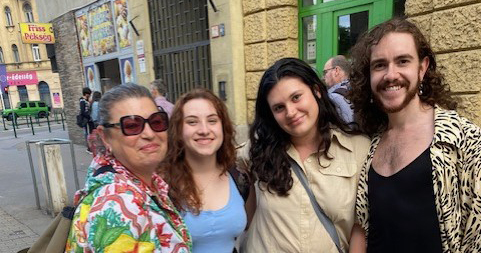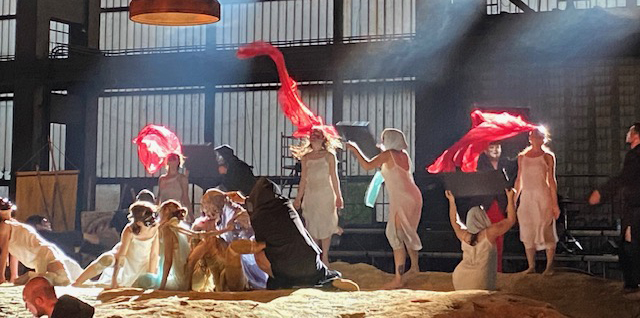
[tta_listen_btn listen_text="Click to listen to this story" pause_text="Pause" resume_text="Resume" replay_text="Replay" start_text="Start" stop_text="Stop"]
Students from the Department of Theatre at York University travelled to Budapest to collaborate with the Hungarian National Theatre on a multi-national production of The Tragedy of Man, commemorating the 200th anniversary of the birth of Hungarian writer, Imre Madách.
The University of Theatre and Film Arts in Budapest invited several foreign theatre programs to participate in the play, which tells the story of Adam and Eve who, after being expelled from Paradise, travel the world guided by Lucifer, in search of humanity's purpose on Earth.
The play is divided into 15 different scenes, and for the production each scene was performed by theatre students from a different country, with their own imagined set decorations, costumes and in their native language. Among the 11 countries invited to Budapest, the School of the Arts, Media, Performance & Design (AMPD) York University cohort was the only North American program included.

When Tereza Barta, a film production professor in the Department of Cinema & Media Arts, was approached by two representatives of the University of Theatre and Film Arts from Budapest at a conference and asked about York undergraduate students participating, she didn’t hesitate. “I thought it would be an absolutely incredible opportunity for the students,” she says and accepted the offer to direct "The Space" scene, which had been assigned to York. The rehearsals lasted for almost a month with York student Mercedes Clunie in the role of Lucifer, Stéphane Arcand in the role of Adam and Kate Counsel cast as The Voice of Earth’s Spirit.
Each country prepared their assigned scene in advance, in their own country, and on June 8, the cast of almost 200 students and 22 faculty members met in Budapest in the Eiffel Art Studios (Hungarian State Opera) to present their work. For the next two weeks, the Hungarian theatre director Attila Vidnyánszky worked with the multi-national cast to weave the scenes into one homogeneous show, with students often rehearing for 12-hour stretches. “There was an absolutely incredible commitment,” Barta says.
During that time, the students were afforded unique experiential opportunities. For one, Vidnyánszky is a celebrated theatre director in Europe, and many of the York students made the most of working with him. “They would try to absorb as much as possible form his direction and methods,” says Barta. “The common denominator that they all had, was this burning passion for this art.”

The multi-national nature of the production also meant the York AMPD students met and collaborated with colleagues from outside Canada, gaining experience with different perspectives and approaches to the craft. “Openness, exposure to other stage concepts, more availability for empathy, understanding various cultures more deeply,” Barta says were outcomes she hoped for the students when she agreed to take part in the project, and she was pleased to see her expectations met. “There was a lot of exchanging points of view about the world about, about the meaning of their art, about the meaning of their lives,” Barta says. “It was quite enriching."
The play – which lasted over seven hours – was performed live in Budapest on June 23, but plans are in place to allow others to screen it later this year and allow others to see the result of the experiential experience the AMPD students participated in.

“This whole theatrical experiment brought us the certainty that the ardour and dynamism with which creators devote themselves to artistic expression is irreplaceable. And on the same occasion, Europe also learned that the future of Canadian theatre remains steadfastly in the hands of the talented and passionate,” says Barta.
